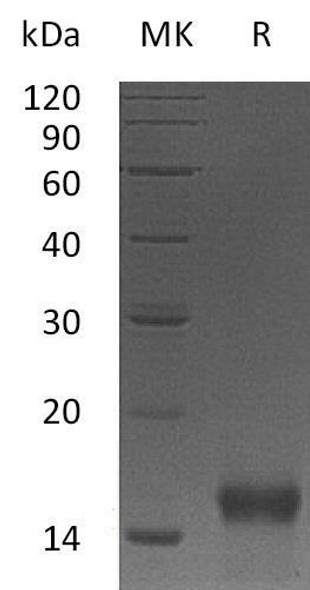Cytokines Recombinant Proteins
Mouse BTC Recombinant Protein (RPPB5725)
- SKU:
- RPPB5725
- Product Type:
- Recombinant Protein
- Species:
- Mouse
- Uniprot:
- Q05928
- Research Area:
- Cytokines
Description
| Product Name: | Mouse BTC Recombinant Protein |
| Product Code: | RPPB5725 |
| Size: | 20µg |
| Species: | Mouse |
| Target: | BTC |
| Synonyms: | Betacellulin, Probetacellulin. |
| Source: | Escherichia Coli |
| Physical Appearance: | Sterile Filtered White lyophilized (freeze-dried) powder. |
| Formulation: | Lyophilized from a 0.2�m filtered concentrated solution in 1�PBS, pH 7.4. |
| Solubility: | It is recommended to reconstitute the lyophilized BTC Mouse Recombinant in sterile 18M-cm H2O not less than 100�g/ml, which can then be further diluted to other aqueous solutions. |
| Stability: | Lyophilized BTC although stable at room temperature for 3 weeks, should be stored desiccated below -18°C. Upon reconstitution BTC should be stored at 4°C between 2-7 days and for future use below -18°C. For long term storage it is recommended to add a carrier protein (0.1% HSA or BSA).Please prevent freeze-thaw cycles. |
| Purity: | Greater than 95.0% as determined by:(a) Analysis by RP-HPLC.(b) Analysis by SDS-PAGE. |
| Amino Acid Sequence: | DGNTTRTPET NGSLCGAPGE NCTGTTPRQK VKTHFSRCPK QYKHYCIHGR CRFVVDEQTP SCICEKGYFG ARCERVDLFY |
| Biological Activity: | The ED50 was determined by the dose-dependent stimulation of the proliferation of mouse Balb/3T3 cells is < 0.01 ng/ml, corresponding to a Specific Activity of > 1.0�108 IU/mg. |
BTC is a potent mitogen for retinal pigment epithelial cells and vascular smooth muscle cells. The effects of betacellulin are probably mediated by the egf receptor and other related receptors.
BTC Mouse Recombinant produced in E.Coli is a single, non-glycosylated polypeptide chain containing 80 amino acids and having a molecular mass of 9.0kDa. The BTC is purified by proprietary chromatographic techniques.
| UniProt Protein Function: | BTC: Growth factor that binds to EGFR, ERBB4 and other EGF receptor family members. Potent mitogen for retinal pigment epithelial cells and vascular smooth muscle cells. |
| UniProt Protein Details: | Protein type:Ligand, receptor tyrosine kinase; Cell cycle regulation; Membrane protein, integral Cellular Component: extracellular space; membrane; integral to membrane; plasma membrane; extracellular region Molecular Function:growth factor activity; epidermal growth factor receptor binding Biological Process: epidermal growth factor receptor signaling pathway; positive regulation of fibroblast proliferation; positive regulation of mitosis; positive regulation of cell division; positive regulation of cell proliferation; positive regulation of cell differentiation; negative regulation of apoptosis |
| NCBI Summary: | This gene encodes a member of the epidermal growth factor (EGF) family. These growth factors are ligands for the EGFR/ErbB receptor tyrosine kinases, and play roles in cell growth and differentiation. The encoded protein is synthesized as a transmembrane precursor that is proteolytically cleaved to generate a mature peptide, and plays a role in the differentiation of pancreatic beta cells. This gene may also play a protective role in acute pancreatitis, whereas increased expression of this gene may contribute to diabetic macular edema. Gene therapy using combinations of this gene and other pancreas-specific transcription factors may induce islet neogenesis and remediate hyperglycemia in type 1 diabetes. [provided by RefSeq, Apr 2011] |
| UniProt Code: | Q05928 |
| NCBI GenInfo Identifier: | 461654 |
| NCBI Gene ID: | 12223 |
| NCBI Accession: | Q05928.1 |
| UniProt Related Accession: | Q05928 |
| Molecular Weight: | 19,664 Da |
| NCBI Full Name: | Probetacellulin |
| NCBI Synonym Full Names: | betacellulin, epidermal growth factor family member |
| NCBI Official Symbol: | Btc�� |
| NCBI Official Synonym Symbols: | Bcn�� |
| NCBI Protein Information: | betacellulin; probetacellulin |
| UniProt Protein Name: | Probetacellulin |
| Protein Family: | Probetacellulin |
| UniProt Gene Name: | Btc�� |
| UniProt Entry Name: | BTC_MOUSE |






